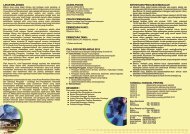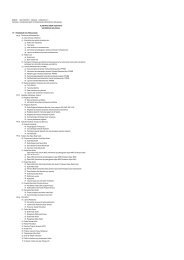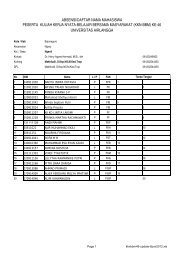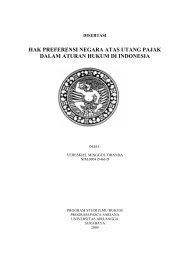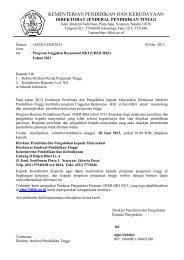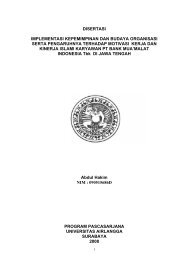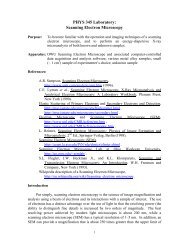Nietzsche's Naturalistic Ethics - UNAIR | E-Book Collection
Nietzsche's Naturalistic Ethics - UNAIR | E-Book Collection
Nietzsche's Naturalistic Ethics - UNAIR | E-Book Collection
Create successful ePaper yourself
Turn your PDF publications into a flip-book with our unique Google optimized e-Paper software.
that reason that the notion of ressentiment requires a more complex account than the reference tothe internalization of instinct leading to anger and resentment. 122.3 I submit that ressentiment is a state of mind arising when the mind becomes conscious of itself12I discuss ressentiment towards oneself and its importance for any account ofressentiment at more length in Risse (forthcoming), a companion piece to this essay. However,the claim needs to be supported at least briefly. In support of the claim that there is indeed arecognizable discussion of ressentiment towards oneself , consider section 6 in Ecce Homo’schapter Why I am so Wise. Discussing ressentiment, Nietzsche writes: “One cannot get rid ofanything, one cannot get over anything, one cannot repel anything – everything hurts. Men andthings obtrude too closely; experiences strike one too deeply; memory becomes a festeringwound.” And further down in the same paragraph: “Nothing burns one up faster than the affectsof ressentiment. Anger, pathological vulnerability, impotent lust for revenge, thirst for revenge,poison-mixing in any sense – no reaction could be more disadvantageous for the exhausted.” Itseems that anger, pathological vulnerability and the other sentiments mentioned are reactions ofa person who does not “get rid of anything” or “get over anything.” Here, for instance,ressentiment is not directed towards others, but tied to the inability to come to terms with one’sown past. Individuals who turned out well (die Wohlgeratenen), whom we shall encounter laterin this section, are characterized in particular by their ability to come to terms with their past: Hebelieves neither in ‘misfortune’ nor in ‘guilt’: “he [the person who turned out well] comes toterms with himself, with others; he knows how to forget -- he is strong enough; hence everythingmust turn out for his best” (EH, Wise, 2). The connection between ressentiment and the inabilityto come to terms with one’s past is present already in the Second Untimely Mediation, althoughNietzsche there, of course, does not talk about “ressentiment.” Consider this passage in UM II, 1:A human being who would like to feel historically through and through would resemble the one who wouldbe forced to deprive himself of sleep, or resemble the animal that should live on ruminating and everrepeated ruminating. So: it is possible to live almost without memory, even to live happily, as the animaldemonstrates; yet it is entirely impossible to live without forgetting. Or, to explain myself even simplerabout my topic: there is a degree of sleeplessness, of ruminating, of historical sense, at which the living isharmed, and ultimately perishes, be it a human being or a people or a culture.The character described here bears strong similarities to the character we just encountered inEcce Homo. While the subject of ressentiment towards oneself requires more attention than wecan give it, note that emphasis on this type of ressentiment, although not common in the currentAnglo-American literature on Nietzsche, is far from idiosyncratic; for it has been a major pillarof Heidegger’s reading of Nietzsche; cf. Heidegger (1954) and (1977), and for discussion,Sugarman (1980) and Koecke (1994). Koecke (1994), p 62f distinguishes between ressentimentin the broader sense and ressentiment in the narrower sense; ressentiment in the narrower senseis like the German word Groll and is directed against others, and in the broader sense it isdirected also against onself.10




